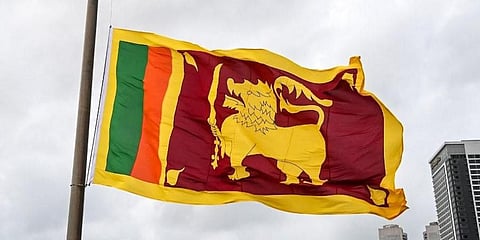

COLOMBO, Sri Lanka: Sri Lanka’s parliament will vote on a proposal to restructure staggering domestic debt in a special session on Saturday as the country struggles with an unprecedented economic crisis.
Sri Lanka’s total debt has exceeded $83 billion, of which $41.5 billion is foreign and $42.1 billion is domestic. The proposed restructuring plan is part of the prerequisites of a bailout package approved by the International Monterey Fund — which has described Sri Lanka’s debt as unsustainable — to help alleviate the country’s humanitarian crisis.
Under the proposed domestic debt restructuring program, the bulk of the debt will be shared by the Central Bank and superannuation funds from which the government already borrowed money, while national banks will be spared because of possible negative ramifications on deposits, according to top government officials.
Central Bank governor, Nandalal Weerasinghe, previously said the treasury bills owned by the bank would be converted into treasury bonds with a longer maturity period and the same has been proposed for superannuation funds. If those funds refuse to be part of the plan they may have to pay a 30% tax instead of the 14% special treatment currently in place.
The government announced a bank holiday until next week to prevent speculation-triggered bank runs, causing customers to withdraw their deposits out of fear over banks’ solvency.
Sri Lankan President Ranil Wickremesinghe said the restructuring of foreign and domestic debt is necessary for the country to overcome the crisis. He said the program would not affect the stability of state-owned and commercial banks or the deposits of about 50 million accounts in the country.
Sri Lanka has been grappling with an unprecedented economic crisis since 2022, after suspending repayment of foreign loans because of a severe foreign currency crisis triggered by the COVID-19 pandemic, excessive borrowing by the government, and efforts by the central bank to stabilize the Sri Lankan rupee with scarce foreign reserves.
Sri Lanka sought the support of the IMF, which approved a bailout package in March, under which nearly $3 billion in government budgetary support will be disbursed in stages.
The government previously said it is seeking to reduce the country’s foreign debt by $17 billion through restructuring. It has already begun talks with foreign creditors including groups such as Paris Club and countries including India and China to restructure the debt.
Debt restructuring can take various forms, including bailouts, renegotiating terms of loans and writing off or reducing the amount owed for some loans.
Sri Lanka’s economic crisis, the worst in its history, caused severe shortages of food, medicine, fuel, cooking gas and electricity last year. That led to massive street protests that forced then-President Gotabaya Rajapaksa to flee the country and resign.
The economy has shown signs of improvement since Wickremesinghe took over as president last July. Shortages have been alleviated, power cuts have ended and the rupee has begun to strengthen.